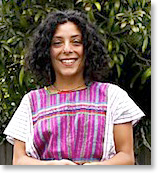|
Urban Agriculture Gets Boost in Oakland
"It's about empowerment and self-reliance, communities growing their own food" by Paul Rockwell Oakland, California |
||||||
"I am able to produce approximately 65 percent of my own produce and 95 percent of my own eggs and more," Sharkey said. "I do this for my personal consumption and tend to share my excess produce with my neighbors. I practice farming openly, and I am proud of my achievements. As a resident of Oakland, I believe it is my right to raise my own food on my own property." However, current zoning laws -- laws passed in 1965 when oil-dependent, industrial agriculture was on the rise -- tend to discourage local farming. Kitty wrote appeals to the Oakland Planning Commission to change the obsolete rules so that future residents of Oakland can grow food in their yards or lots, without prohibitive regulations. As if to answer Kitty's pleas, the Oakland Planning Commission last month updated the city's agricultural regulations. Two amendments drafted by the Planning Commission staff with City Council members Lynette Gibson McElhaney, Dan Kalb and Rebecca Kaplan. The Food Policy Council provided technical assistance and community input. The changes remove lengthy and expensive permitting procedures for raising and selling food on a lot. Growing fruits, vegetables, and herbs, keeping two or three beehives, selling food on or off site -- agricultural activities -- are "permitted outright." Change does not come easily. For more than four years, the Oakland Food Policy Council worked with community activists and lobbied city members to facilitate urban farming in Oakland, especially in low-income communities in West and East Oakland. The food council collected hundreds of signatures on petitions. Individuals wrote letters. I spoke this past week with Esperanza Pallana, director of the Oakland Food Policy Council. She was elated by the hard-fought victory for urban agriculture. The new policy, she said, "enables Oaklanders to use blighted land creatively and productively to feed the city." Our focus, she noted, is not on charity. It's about empowerment and self-reliance, communities growing their own food, feeding themselves, setting up farmers' markets. She described the Planning Commission resolution as a historic "step for the city of Oakland in supporting the residents' right of self-determination and localized food production," especially for residents who have little access to fresh produce. Kelly Carlisle, CEO of Acta Non Verba, a popular youth farm in East Oakland, was honored last year at the White House by President Obama for her pioneering efforts to create community gardens in low-income neighborhoods in Oakland. She was pleased with the outcome of the Planning Commission decision. After the meeting, she said: "It's a big victory. Small urban farm operations, like our own, will not be required to get use permits, which cost around $3,000. The old system was arduous and complex. Now we can grow food, outside of public parks, without pre-approval." On Oct. 14, Oakland's "good-food movement" passed another hurdle, when the Community and Economic Development Committee reaffirmed the Planning Commission recommendations by a vote of 3-to-1. Council members Libby Schaaf, Patricia Kernigan and McElhaney voted for the measure while Larry Reid abstained. (The contentious issue of livestock on new farms was set aside for future discussion.) The Planning Commission farm-friendly ordinance goes beyond bureaucratic issues. It recognizes that growing food in Oakland is a right, not a conditional privilege that requires a permit. (Click here to read about the victory at City Council.) As Kitty Sharkey puts it: "The adoption of the proposal will be a huge step forward in ensuring the availability of wholesome and nutritious food throughout our community regardless of socio-economic status." About the author: Paul Rockwell, is an outdoor columnist for the Hills Newspapers, Bay Area News Group. He can be reached at: gonetubin2@gmail.com. Also see: Victory for Urban Farms and Gardens at the Oakland City Council by Paul Rockwell Oakland, California UN-masking Climate Smart Agriculture History presents itself first as tragedy, and the second time as a farce by La Via Campesina New York, New York Published in In Motion Magazine November 8, 2014
|
||||||
If you have any thoughts on this or would like to contribute to an ongoing discussion in the  What is New? || Affirmative Action || Art Changes || Autonomy: Chiapas - California || Community Images || Education Rights || E-mail, Opinions and Discussion || En español || Essays from Ireland || Global Eyes || Healthcare || Human Rights/Civil Rights || Piri Thomas || Photo of the Week || QA: Interviews || Region || Rural America || Search || Donate || To be notified of new articles || Survey || In Motion Magazine's Store || In Motion Magazine Staff || In Unity Book of Photos || Links Around The World NPC Productions Copyright © 1995-2020 NPC Productions as a compilation. All Rights Reserved. |


